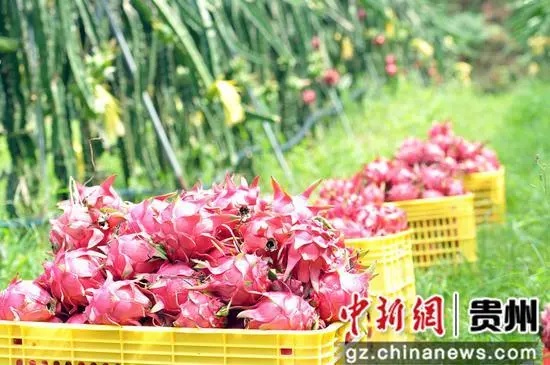Eco-friendly approaches lead to economic benefits for villagers

Photo shows harvested dragon fruits being stored in baskets in Luodian county, Guizhou province. [Photo/gz.chinanews.com]
By adopting an eco-friendly planting and breeding system, Moyang village in Luodian county, Guizhou province, has obtained economic and ecological benefits in its path to rural vitalization.
Li Caihua, president of Guizhou Luodian Zhaofeng agricultural science and technology promotion company, which is in charge of a 73-hectare dragon fruit planting base in Moyang, said the base uses a "green" method to reduce weeds.
The base interplants the common vetch and soybean, which reduces the instance of weeds and rakes in around 1,000 yuan ($136).
Meanwhile, local residents are raising livestock. To feed them, the base offers farmers grass in exchange for cattle and sheep manure that can be used as organic fertilizer after fermentation in a methane-generating pit. Chickens, ducks and geese can help the base capture vermin between December and June.
They also raise bees, which can help pollinate the dragon fruit. In return, the base helps residents with technical guidance and honey sales.
"That's win-win cooperation," Li added.
Dragon fruit can grow without the use of chemical fertilizers, pesticides, herbicides, hormones, genetically modified seeds or agricultural plastic film.
Such a result is achieved using a cooperation mechanism that connects enterprises, cooperatives and farmers.
By collaborating with enterprises, cooperatives can get 540,000 yuan in dividends every year, of which 378,000 yuan in dividends will be allocated to 450 households and the rest to be used by the village as investment capital.
The company pays 646,400 yuan to 242 households for the 73 hectares of farmland from local residents.
The base employs 31 permanent workers and offers over 1,500 temporary jobs during harvest season, paying salaries of 1.3 million yuan a year.
"We used to plant dragon fruit, but the market demand was volatile. Later we transferred our land to the base. I can receive rent and dividends every year. As a worker, I can earn 3,500 yuan per month," said Huang Yuanmei, a resident of Moyang.
Now the base sells dragon fruit to markets in Beijing and Shanghai, as well as Hunan and Guangdong provinces. This year, the overall dragon fruit yield will reach 1,600 metric tons worth 12.8 million yuan.
"We don't need promotion. This base is already a well-known scenic spot. Tourists who pick dragon fruit often take photos and post them online. That's the best advertisement," Li added.
To increase productivity, the base has applied advanced agricultural practices, such as drop irrigation and drones, to ensure a steady supply of high-quality fruit.
"In the past, we needed 31 workers for a month to finish fertilization. Now leaf fertilizer can be applied by drones within five to seven days and it requires only three workers.
Located in the southwestern part of China, Luodian dragon fruit became a nationally protected geographical indication product in 2014. One year later, it was awarded the title of "hometown of Chinese dragon fruit," local news outlet Tianyan News reported.
This year, Luodian produced an estimated 39,000 tons of dragon fruit valued at 312 million yuan, benefiting 30,200 people in 7,000 households in 57 villages.
























